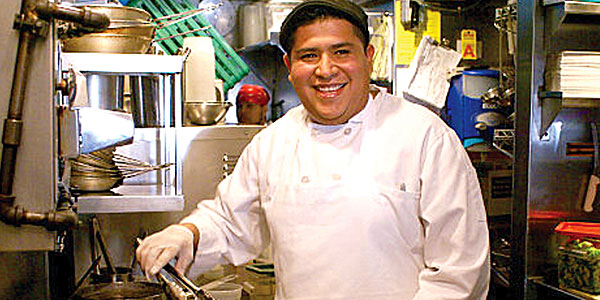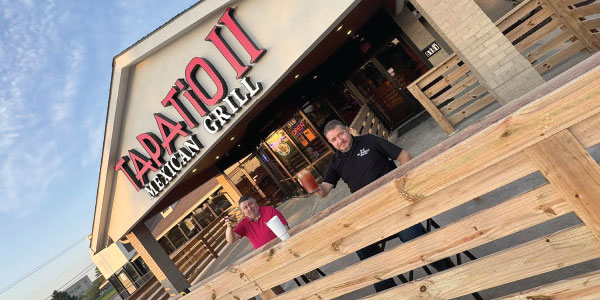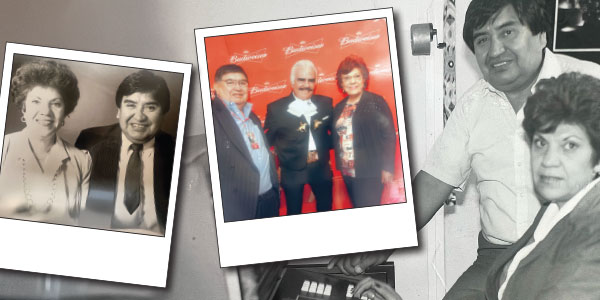“Visto desde fuera, (México) se ve como muy dramático . como la guerra.”
– Antonio Banderas (actor)
NUEVA YORK – Los veo por todos lados. En los hoteles, en los restaurantes, en las construcciones y en cualquier lugar donde haya que hacer un trabajo difícil. Son inmigrantes mexicanos que vienen del central estado de Puebla, y que ayudan a que Nueva York sea la capital del mundo.
Han llegado durante años en cadenita. Uno trajo al cuñado y a sus hijos, otro a la prima y una más a los hermanos. En la ciudad de Nueva York viven, más o menos, medio millón de mexicanos, y el grupo más grande viene de Puebla. Dejaron un clima templado y mil broncas económicas para adaptarse a un invierno imposible y trabajos en dólares – dólares para enviar a México, para que sus hijos vivan mejor que ellos, para soñar que todo aquí sí se puede lograr.
Cuando voy a un restaurante en Nueva York, muchas veces termino en la cocina. Hay siempre historias increíbles, salpicadas de risas, entre platillos que van y vienen. Acabo de ir a uno francés y a otro italiano, y la mayoría de sus empleados eran poblanos. Aquí se reinventaron de chef, de mesero, de lavador de platos, de lo que sea para sobrevivir.
Están rotos. “Allá dejamos a la familia,” me contó Ramón, saliendo de una cocina. “Pero la chamba está acá.”
No todos tienen papeles. Cuando oyen a Donald Trump acusarlos de ser criminales y violadores – según dijo al lanzar su candidatura presidencial – saben que Trump está totalmente equivocado: Ellos construyeron sus edificios, ellos cosechan la comida que come, ellos cuidan sus hoteles.
Están aquí, pero pensando en allá. México les duele, sobre todo porque no pueden regresar. Cruzar a Estados Unidos les costó mucho trabajo y dinero. La frontera entre ambos países está más vigilada que nunca. Ir a Puebla de visita, en el verano o en navidades, es un riesgo que no pueden correr.
La nostalgia empieza en la lengua y con el mole. El más rico es el que les llega en pasta desde Puebla, en bolsitas de plástico, y solo le tienen que añadir caldo de pollo. “Ese sí sabe al pueblo,” me dijo uno de Atlixco. Las noticias, en cambio, les llegan por celular; llegan muy tarde a casa como para enterarse por la televisión.
Pasé la última semana en Nueva York y platique con varios poblanos sobre México. Eso nos pasa a los que nos fuimos; no podemos dejar de hablar del lugar que dejamos. Pero es un lenguaje codificado, difícil de seguir para quien no es mexicano. Hablamos del “Piojo” y del “Chapo.” Traducción: de cómo corrieron al entrenador de la selección mexicana de fútbol por sus errores, y de cómo dejaron en sus puestos al secretario y a los funcionarios a los que se les escapó de la prisión el principal narco del mundo. Nos reímos, por absurdo, porque ya nada de eso nos sorprende.
A mí me había tocado mucho el asesinato del periodista veracruzano, Rubén Espinosa, y lo comenté en una plática. Más de 80 periodistas han sido asesinados en México en la última década, según Reporteros Sin Fronteras. Casi todos esos crímenes están impunes. “Está dura la cosa en México ¿verdad?” me dijo resignado un mesero poblano, entre la pasta y el postre. Y lo peor es saber que Rubén no será el último.
Con la devaluación del peso mexicano rinden mucho más los dólares que envían. En Tenango de las Flores o en Cholula, me cuentan, es fácil saber quien recibe dólares; la casa está bien pintadita y, a veces, hasta tiene un segundo piso.
Antes las mujeres y sus hijos esperaban a los hombres. Ahora ya nadie espera. Los que se van de Puebla – lo sabemos todos – ya no regresan. Más bien, se traen a los que dejaron atrás. Con lo difícil y peligroso que está cruzar la frontera, los únicos que vuelven, y por un ratito, son los deportados.
Y poco a poco voy notando el cambio. Los poblanos que llevan más tiempo en esta ciudad de las prisas hablan menos del fútbol y de la política mexicana. En cambio, están siguiendo más lo que dice “el tal Trump” e investigando qué candidato presidencial pudiera legalizarlos. Muchos de sus hijos ya nacieron aquí y por lo tanto son estadounidenses. Y si sale todo mal, me dicen, están dispuestos a ser la generación del sacrificio, la que se la jugó por los que vienen detrás.
Nueva York tiene una enorme deuda con Puebla. Funciona, y funciona bien, por miles de estos seres semi-invisibles que hacen lo que nadie más quiere hacer.
Sí, Nueva York es una gran ciudad. Pero Puebla York es la que mejor me recibe a mí.
“Seen from the outside, Mexico looks very dramatic . it’s like a war.”
– Antonio Banderas (actor)
NEW YORK — I see them everywhere: at hotels, restaurants, construction sites. Anywhere that hard work needs doing, you’ll find these immigrants from the state of Puebla, in central Mexico. They are helping New York City remain the capital of the world.
For years, these immigrants have arrived in the United States, documented or not, as if on an unending conveyor belt. One brought his brother in-law and his sons over, another his cousin. Roughly half a million Mexicans live in New York, and a substantial number of them come from Puebla. Most left behind mild weather and tough economic obstacles, adapting to New York’s harsh winters for the ability to earn dollars in low-paying jobs. So they work, and send what earnings they can back to Mexico so their children can live a bit better than they did.
I recently spent a week visiting New York, and often when I am dining at a restaurant in the city, I make it a point to visit the kitchen. In the back, as plates come and go, I always find workers who are willing to tell their stories, almost always sprinkled with humor.
At French and Italian restaurants, I found that most of the employees working in the kitchen were “Poblanos.” No matter what their professions were back in Puebla, in New York they have reinvented themselves as chefs, waiters, dishwashers or whatever position allows them to survive.
However, many are here reluctantly. “We left our families behind,” said a worker named Ramon, after his kitchen shift was done. “But the bacon is here.”
They may be in the U.S., but their minds are back in Mexico, a place they cannot return to. Crossing into the U.S. took a great deal of effort and money, and these days the Mexican border is more heavily patrolled than ever. So a summer or Christmas visit to Puebla is a risk that they cannot afford.
This is why Donald Trump’s recent anti-immigrant rhetoric is especially stinging. When the Republican presidential hopeful likened Mexican immigrants to rapists and criminals during his announcement speech a few weeks ago, these Poblanos knew that he was utterly wrong. Mexican immigrants build Trump’s buildings, they harvest the food that he eats and they take care of his hotels. Yet there he was, attacking them.
The Poblanos and I also spoke about Mexico — specifically about the fact that the national soccer coach was recently fired following some mistakes, while the officials who allowed “El Chapo,” one of the most infamous drug dealers in the world, to escape from prison got to keep their jobs. All we could do was laugh at the absurdity, since nothing that happens in Mexico can surprise us anymore.
In addition, we discussed the recent murder of Ruben Espinosa, a Mexican journalist from Veracruz. According to Reporters Without Borders, more than 80 journalists have been killed in Mexico in the last decade, and most of these crimes have gone unpunished. “Things are hard in Mexico, aren’t they?” asked a Poblano waiter, between delivering pasta and dessert courses. The worst thing is knowing that Ruben won’t be the last journalist to fall.
The devaluation of the Mexican peso is yielding a bit more buying power for their families, according to these workers. In the towns of Tenango de las Flores or Cholula, I am told, it’s easy to know who receives dollars — some houses are newly painted or now have a second floor.
Back home, it used to be that women and children waited for the men return after they spent time working in the U.S. But these days fewer and fewer people are waiting. Those who leave Puebla will never come back, so they focus on bringing the family that they left behind to the U.S. The only people who return, in fact, are those who get deported after making the long and treacherous journey north.
Many of the people I spoke with in New York have children who were born here and, thus, they are American. I find that these Poblanos, the ones who have been here the longest, talk less about soccer and Mexican politics, and more about what that “Trump character” is saying. They are studying which presidential candidates might offer them a path to legalization. If everything goes wrong, they are ready to be the generation of sacrifice — the one that risked everything for those who will come later.
Meanwhile, they will work as hard as they can.
New York owes a huge debt to these Poblanos. The city functions well thanks to the efforts of thousands of semi-invisible laborers who do the work that nobody else wants to do. This Puebla York is, indeed, a great place thanks to their efforts.











